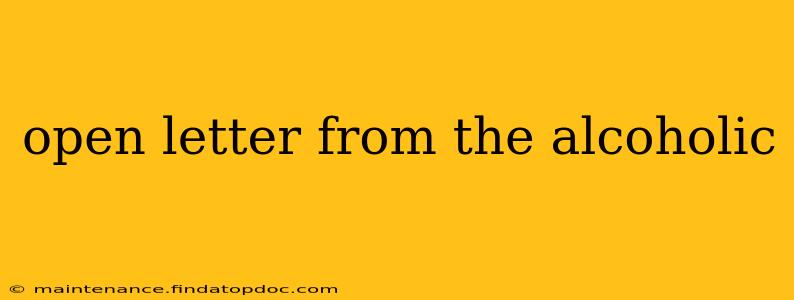To the world, to my loved ones, to myself:
This isn't a sob story, nor is it a plea for pity. It's an attempt at honesty, a brutal self-assessment from the heart of the storm. I am an alcoholic. These words, typed out, feel heavier than any burden I've carried before. The weight of this admission isn't just mine to bear; it impacts everyone around me, and for that, I am deeply sorry.
For years, I’ve built a facade. A carefully constructed performance of normalcy masking a devastating internal struggle. I've laughed, loved, and worked, all while the insidious grip of addiction tightened its hold. I've lied, cheated, and manipulated, justifying my actions with excuses that even I knew were hollow. The shame is a constant companion, a shadow that never fully leaves my side.
What Does it Feel Like?
This isn’t about romanticising the “high.” The fleeting moments of escape are far outweighed by the crushing weight of the hangover—not just the physical one, but the emotional and spiritual wreckage left behind. It's the constant anxiety, the crippling self-doubt, and the overwhelming sense of isolation that lingers long after the last drink. It's the betrayal of trust, the erosion of relationships, and the slow, agonizing destruction of self-respect.
How Did This Happen?
There’s no single answer. It wasn’t a switch that flipped. It was a slow, insidious creep, a gradual descent into darkness. It started with social drinking, a way to relax, to fit in. But somewhere along the line, the escape became the necessity, the coping mechanism overshadowing every other aspect of my life. I lost myself in the bottle, seeking solace in a substance that ultimately only amplified my pain.
Why Haven't I Stopped?
This is perhaps the question I wrestle with most. The answer is complex, a tangled web of physical and emotional dependencies. It's the fear of facing the underlying issues, the uncomfortable truths I've been avoiding for so long. It's the comfort, however twisted, of numbness. It's the sheer terror of confronting the reality of my life without the crutch of alcohol.
What's Next?
This letter isn't just about admitting my problem; it's about taking responsibility. It's about starting the long, arduous process of recovery. This means seeking professional help, confronting my demons, and rebuilding the bridges I've burned. It means accepting support, acknowledging my flaws, and working tirelessly to become a better version of myself.
I know this journey will be challenging, filled with setbacks and relapses. But I'm committed to fighting for my life, for my relationships, and for my future. I'm asking for understanding, patience, and, above all, forgiveness. It won't be easy, but I'm determined to face this, one day at a time.
Frequently Asked Questions:
H2: What are the signs of alcoholism?
The signs are varied and can be subtle at first. They might include increased tolerance to alcohol (needing more to achieve the same effect), withdrawal symptoms when you stop drinking (shaking, sweating, anxiety), neglecting responsibilities due to drinking, unsuccessful attempts to cut back, continued drinking despite negative consequences (relationship problems, job loss, health issues), and prioritizing drinking over other activities and relationships.
H2: How can I help someone with alcoholism?
Offer support without enabling. This means setting clear boundaries and not covering up for their drinking. Encourage them to seek professional help. Educate yourself about alcoholism and the resources available. Most importantly, let them know you care and are there for them, even if they don't accept help immediately.
H2: What is the treatment for alcoholism?
Treatment options vary and often involve a combination of approaches. These can include detoxification (medically supervised withdrawal), therapy (individual or group), support groups (like Alcoholics Anonymous), medication to manage withdrawal symptoms or cravings, and ongoing counseling to address underlying issues.
H2: Is alcoholism a disease?
Yes, alcoholism is widely recognized as a chronic relapsing brain disease. It affects the brain's reward system, making it difficult to control drinking despite negative consequences.
This is my story, my truth. I hope, by sharing it, I can help others understand, and perhaps, even find the courage to seek the help they need. Thank you for listening.
